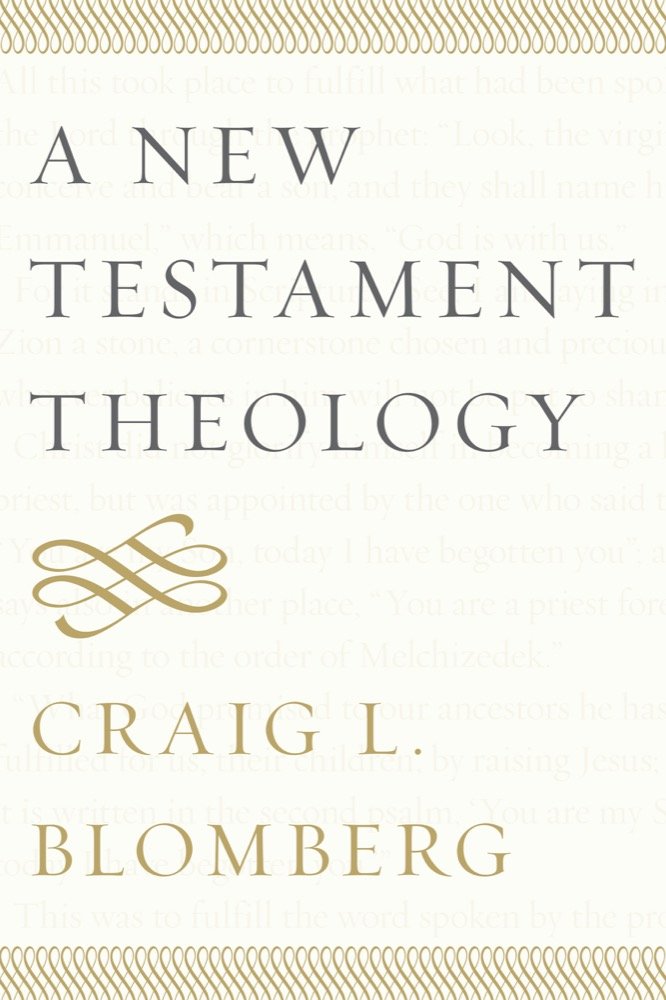An Author Interview from Books At a Glance
Greetings – I’m Fred Zaspel, and welcome to another Author Interview here at Books At a Glance.
If you keep up at all with biblical and theological studies you can’t help but to have noticed that the fruitful discipline of Biblical Theology has come to its own in our generation. Craig Blomberg has reflected on all this for some years, and he brings us now the latest contribution to the field in his new magnum opus, entitled, A New Testament Theology. It’s an excellent work, and we’re happy to have him with us today to talk to us about it.
Craig, welcome back, and congratulations on this major accomplishment.
Blomberg:
Thank you very much.
Zaspel:
First, there have been several different approaches taken in what is called “New Testament Theology.” You make this point, in fact, in your title – A New Testament Theology rather than The Theology of the New Testament. What is distinctive about the approach you have taken? And how does it compare to some of the other alternatives?
Blomberg:
Right. I suppose you could boil things down to two major approaches. One is to trace key themes in the New Testament (the same would be true if you were talking about Old Testament theology) and see how concepts like Covenant or Kingdom or Law or Grace and so forth are treated across the canon of a particular Testament by the various authors. Or, you can arrange things by the parts of the Testament and then see what some of the dominant and distinctive themes are in Matthew, Mark, Luke, Paul, John, and so forth. There’s good value to both approaches. I think there are some excellent works available from not that long ago on the first approach, but what I’ve been missing for some time, I suppose George Ladd is the last well-known American author to do it, is the second approach, where authors who have written more than one book are kept together. There is certainly a time and a place to do something, for example, that goes through each letter of Paul, individually, and says what are the particular emphases and distinctives of Romans, and then 1 Corinthians, then 2 Corinthians, and so on. But I have found the greatest value over the course of my studies and career, when somebody puts together a synthesis of what does Luke, for example, teach across both Luke and Acts? What does Paul teach across all of his works? What about John, who has authored multiple works? So that’s what I tried to do – something that would proceed both chronologically and canonically across the major parts of the New Testament and then focus on the dominant distinctive themes in each of those parts.
Zaspel:
There have been several attempts to demonstrate what is “the center” of New Testament Theology; but finding a consensus on the question has proven difficult. Why is that so? And how might the idea of “fulfilment” help in that quest?
Blomberg:
Well, I think a big part of the problem is that you either aim at something too narrowly or too broadly. George Ladd, who I mentioned already, talked about the Kingdom of God as the integrating theme. And there are parts of the New Testament, especially the teachings of Jesus in the synoptic Gospels, where that works very well, but there are other parts where that topic is barely mentioned. One thinks, in our day, of somebody like John Piper, who has perhaps championed justification by faith as strongly as anyone, and in Paul, especially in Galatians and Romans there is no question that that’s central. But is that something you find equally so in, say, 1 Peter or Jude or 3 John? And so, then, the temptation is to say, well, it’s all about God. Well, yes, it is. No disputing that, whatsoever; but can we be any more specific? Well, it’s about Jesus, because Jesus is now revealed as God incarnate. Yes, agreed; can we keep going? Well, how about the triune God? No quarrels, whatsoever; but what did he do? And if one understands that every one of the New Testament writers was writing out of a milieu or worldview in which there was already an acknowledged body of literature known as Scripture, known as the Bible for the Hebrew people, and if one sees how especially in the prophets, book after book ends waiting. Waiting for all that God has promised in the future is still to come true. Then you can start to see that a unifying theme across the New Testament works, is that that moment has now arrived with the ministry and person of Jesus. Both in general, but then in just a sheer number of ways that the New Testament references specific parts of the Old Testament is being fulfilled in almost every book.
Zaspel:
Once you decided that the idea of fulfilment should set the agenda, there were still other decisions that had to be made in organizing your work. Give us a brief overview sketch of how you approach all this.
Blomberg:
Well, I mentioned some of them in terms of, do I proceed through the different parts of the New Testament, but I also had to deal with questions of chronology. Do I just go from Matthew to Revelation in that order? Or do I try to put the books in some kind of chronological sequence? There have been a lot of people who have argued that there is some kind of development from the earliest books of the New Testament to the later books. Or even development within a given writer from, say, the earliest letters of Paul to the later ones. So, would something like that emerge if one tried to follow as chronological a sequence as possible? And then you have to deal with questions about those books that don’t have a clear-cut date. There is often a debate between an earlier or a later date, so there’s not just one possible chronology. Add to that, how many books did Paul write? While I didn’t accept Hebrews, despite some King-James-only folks who would still make that link, I think the other thirteen books attributed to Paul came from him. But did he use a scribe or an amanuensis at any point, and give him a certain amount of freedom to express Paul’s thoughts in his own words? There have been writers off and on throughout church history and several fairly recently who have suggested that one of the reasons the so-called pastoral epistles, 1 and 2 Timothy and Titus, are as different as they are from the other letters of Paul is because Luke may have been the amanuensis. And once you compare some of the major themes in those three letters with several of the major themes in Luke and Acts, you can start to see why people have said that. I could keep on going, but that probably gives you a feel for some of the additional issues.
Zaspel:
You begin with a theology of Jesus that is separate from your later chapters on the theology of the various Gospel writers. And your second chapter is on the theology of the earliest church, again separate from the other New Testament books. These approaches are both unusual. Can you explain this for us?
Blomberg:
Well, they are unusual, depending upon what you compare them to. George Ladd did both of those and there is a history of German scholarship including several books that have been translated into English that have done precisely that. Although they have tended to be fairly skeptical about how much we can know about what Jesus taught and believed, and likewise somewhat minimal about what we can say with confidence about the early church. A generation ago, when I was in school, and again more recently with a writer like Udo Schnelle’s Theology of the New Testament, you find that structure, but it has not been widely adopted by recent works. So, if I’m going to take the time to do something this major, there might as well be some distinguishing marks, and I thought that was one that would be important.
Zaspel:
Are there any significant observations that arise from comparing the theology of the earliest New Testament books to the latest?
Blomberg:
Yes. They’re not that different. (Laughing) And this is something that a number of scholars have been saying in the whole area of Christology of scriptures in the New Testament’s belief about who Jesus was. There have been some very important studies, maybe none as extensive as Larry Hurtado’s book, Lord Jesus Christ, that came out in the 2000’s, that say you find a very, very high and exalted view of who Jesus was as the divine Messiah right from the earliest books and even the earliest sources that we can reconstruct from those books. I’m not aware that anybody has attempted on any widescale basis to do that for all of the other doctrines, and certainly that was not the major thrust of what I tried to do, but I did ask, at the end of it all: Now that we’ve looked in at least one possible chronological order at the major emphases of each part of the New Testament canon, does some clear trajectory of, as has sometimes been called, evolutionary development of Christian thought appear? And I just didn’t see it.
Zaspel:
This book weighs in among the larger sizes – nearly 800 pages – and it is comprehensive. How long were you working on all this?
Blomberg:
I always struggle to know how to answer that question because I’ve taught different parts of New Testament theology for probably about thirty-five years. But I would say, in a sustained way, primarily over the last five years.
Zaspel:
Are you working on any other books that we can keep an eye out for?
Blomberg:
Oh, I’ve always got way too many irons in the fire.
Zaspel:
Any coming out soon? Sooner than later?
Blomberg:
Sooner than later? Yes, hopefully. A bit of a digression from some things that circumstances sort of foisted on me. I found myself, thanks to a couple of debates hosted by some good folks at Oregon State University in recent years, doing a small work with an atheist, debating the resurrection. It’s going to be called, Resurrection: Fact or Faith? And then we have two scholars who have done some excellent work on each side of the debate: Richard Carrier, a prominent atheist, and Peter Williams from Great Britain, who has done some excellent work on the evangelical side, who both weigh in on their opinions on our debate. That will be the next thing, due out sometime this Spring.
Zaspel:
Who is publishing that?
Bloomberg:
It’s called Pitchstone. It’s a small press from the Eastern Seaboard that I think tends to be more atheist-friendly than Christian-friendly, but that’s the audience I’d like to have at least my side get a hearing among.
Zaspel:
We’re talking to Dr. Craig Blomberg about his excellent new book, A Theology of the New Testament. It’s a superb new resource for understanding the teaching of the New Testament, and we’re very happy to commend it to our readers.
Craig, congratulations again, and thanks so much for talking to us about your new work.
Blomberg:
Well, thank you so much for having me.

